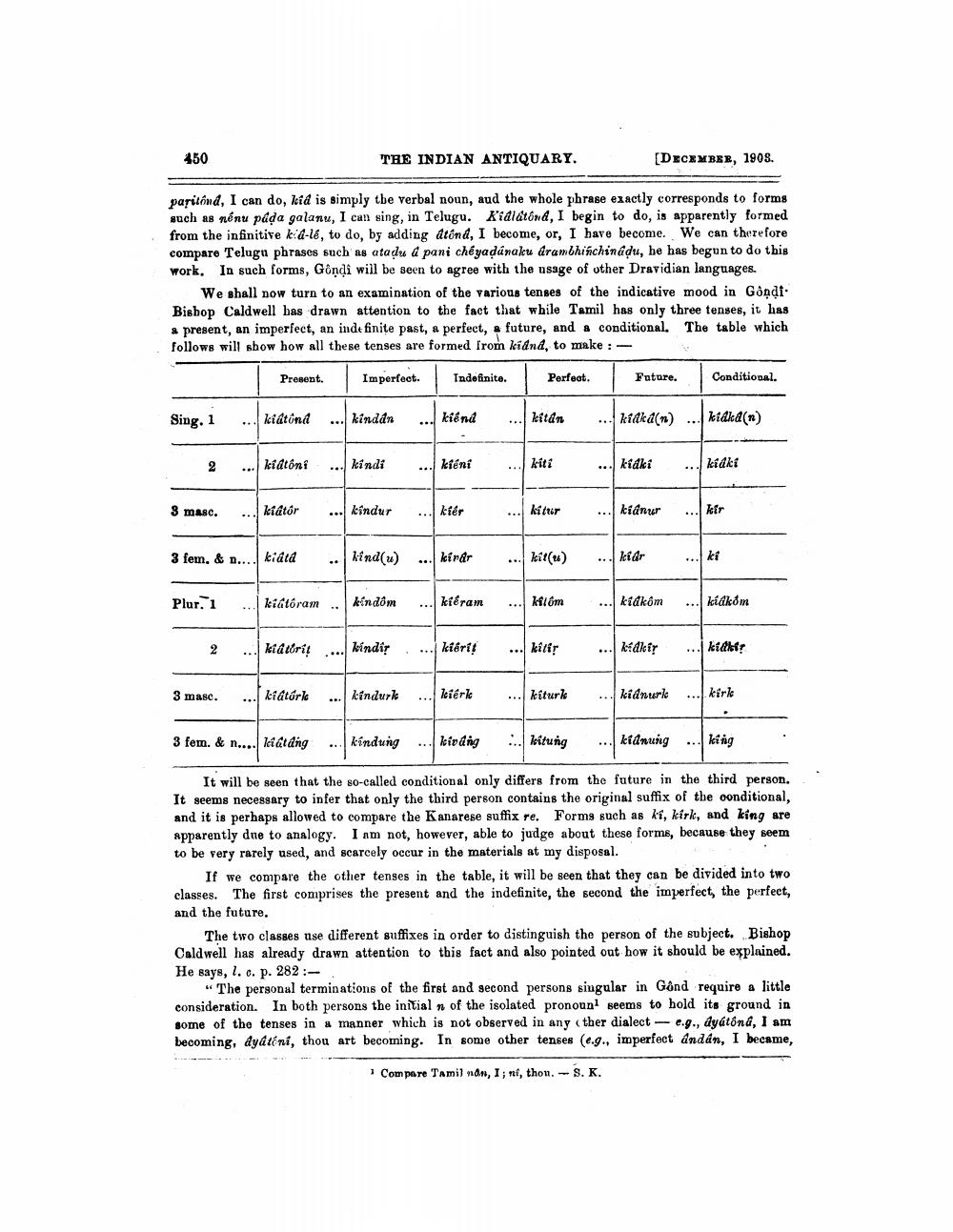________________
450
THE INDIAN ANTIQUARY.
DECEMBER, 1908.
pasitônd, I can do, lid is simply the verbal noun, aud the whole phrase exactly corresponds to forms such as nenu pada galanu, I can sing, in Telugu. K'idi&tond, I begin to do, is apparently formed from the infinitive kid-16, to do, by adding atond, I become, or, I have become. We can therefore compare Teluga phrases such as atadu & pani chéyadánaku drambhinchinadu, he has begun to do this work. In such forms, Gôndi will be seen to agree with the usage of other Dravidian languages.
We shall now turn to an examination of the various tenses of the indicative mood in Gôndi. Bishop Caldwell bas drawn attention to the fact that while Tamil has only three tenses, it has a present, an imperfect, an indefinite past, a perfect, & future, and a conditional. The table which follows will show how all these tenses are formed from kidnd, to make :
Present. Imperfect. Indefinite. Perfest. Fature. Conditional.
Sing. i ... kiátôna ... kindân
... kiêná
... kitan
... kiaka(n) ... kidka(n)
2
... kidtóni
... kindi
kiéni
kidki
... kidki
8 masc.
... ki&tór
... kindur
... kiér
...kitur
... kiânur
... kir
3 fem.& n.... kidta
kind(u)
... kirar
... kiar
...ki
Plur, 1
... leiatoram .. kindôm
... kiéram
...
kilom
kidkom
... kídkom
2
... kidttrit .... kindir
... kiárit
kidkir
... kidkir
3 masc.
... kiátórle ... kindurk
... kiếrk
... kiturke
... kidnurk ...kirke
3 fem. & n.... kitang
... kindung
... kivding
..kitung
... kidnung
... king
It will be seen that the so-called conditional only differs from the future in the third person. It seems necessary to infer that only the third person contains the original suffix of the conditional, and it is perhaps allowed to compare the Kanarese suffix re. Forms such as ki, kirk, and king are apparently due to analogy. I am not, however, able to judge about these forms, because they seem to be very rarely used, and scarcely occur in the materials at my disposal.
If we compare the other tenses in the table, it will be seen that they can be divided into two classes. The first comprises the present and the indefinite, the second the imperfect, the perfect, and the future.
The two classes use different suffixes in order to distinguish the person of the subject. Bishop Caldwell has already drawn attention to this fact and also pointed out how it should be explained. He says, I. c. p. 282 :
The personal terminations of the first and second persons singular in Gônd require a little consideration. In both persons the initial n of the isolated pronoun' seems to hold its ground in some of the tenses in # manner which is not observed in any (ther dialect -- e.g., dyatona, I am becoming, dydiini, thou art becoming. In some other tenses (e.g. imperfect andan, I became,
1 Compare Tamil nom, I; ni, thon. - S. K.




